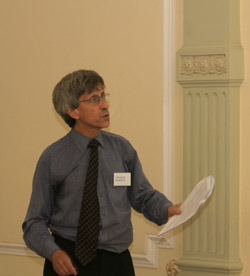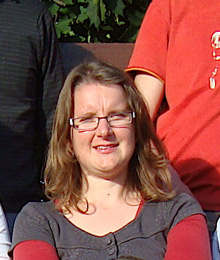"A good mix of younger and more experienced scholars!" — small interview of participants of the conference "Illegitimate Argumentation in Western Intellectual Culture"
|
London University) |
1) Could the idea of putting together historians and logicians be fruitful for either historical disciplines or logic?
Charles Burnett:
The papers themselves were rather on logical and philosophical questions, and on the history of logic, philosophy and ideas, rather than on straightforward history. What was valuable for the conference was to have focuses on particular issues—the detection of truth and falsehood, magnetism, action at a distance, natural laws, the concept of legitimacy—as dealt with by scholars from different fields: philosophy, history, philology, as well from different cultural backgrounds: British, French, Russian.
Stephen Read:
It is good to put logicians and historians together and encourage each to consider their work in relation to the other aspect. This is all too rare on both sides, and is important for the health of both disciplines.
Vanessa Obry:
Such an interdisciplinary encounter enables to compare different ways of searching in the same subject. I think that logic (or linguistics) may bring lots of fruitful tools for historical and literary research. However I have to confess that I couldn't understand all the logician's papers, as logician and historian unfortunately still have very diverging interests and way of thinking.
Maud Pérez-Simon
L'idée de rassembler logiciens et historiens au sein d'une conférence est intéressante et a suscité de nombreux échanges individuels fructueux. Toutefois, en logique, la définition de la légitimité semble différente de celle des historiens et il est dommage que nous ne soyons pas revenus sur ce point. Il pourrait être intéressant pour une prochaine fois de coupler au sein de chaque session un logicien et un historien pour travailler sur un sujet très précis et leur demander de comparer leurs approches.
2) How do you find the idea of collective “teacher-pupil” reports?
Charles Burnett:
An interesting experiment, of which there was not a consistent pattern: in some cases the student and teacher made a joint presentation; in other cases, they gave talks on different topics. The important thing is that one has a good mix of younger and more experienced scholars, and the actual format should not be rigidly prescribed.
Stephen Read:
I found the "teacher-pupil" aspect of the conference very attractive and successful. It was one of the main things that encouraged me to take part, and my impression was that it worked very well. I was particularly impressed by the Russian students, especially the undergraduates, who would put several of our students to shame.
Vanessa Obry:
I really think it was a good idea! And I even would have liked to have listen to more collective reports.
The paper "for two voices" make the conference more dynamic, although pupils are obviously not used to speaking publicly. It seems to me that it really has great pedagogical virtues for the pupils, and it is for everyone an opportunity to meet specialists and young researchers (or future specialists). The "teacher-pupil" reports are also pleasant as they embody the transmission of knowledge.
Maud Pérez-Simon
Chaque enseignant l'a comprise de façon très différente et l'ensemble permettait de réfléchir à la notion d'écriture conjointe, qui est un exercice très difficile. L'idée d'Oleg Voskoboinikov d'organiser un débat avec son étudiante me paraît originale et particulièrement adaptée au sujet de la légitimité-illégitimité.
|
Vanessa Obry |
3) Is there a way for comparing Russian and West-European students?
Charles Burnett:
Russian students seem to be younger than their West European counterparts. The differences between the two sets of students make the meeting interesting.
Vanessa Obry:
It seemed to me that the main difference between Russian and West-European students (and researchers) is the way of organizing and structuring their speech. The Russian way seems to be much more linear.
Maud Pérez-Simon
La question porte-t-elle sur les étudiants du public ou sur les étudiants qui ont parlé lors de la conférence? Si elle porte sur les étudiants du public, je dirais que les étudiants russes semblent plus intéressés par les conférences que les français et posent des questions particulièrement savantes et qui montrent une grande connaissance du Moyen Âge.
Si elle porte sur les étudiants de la conférence, je dirais que les étudiants russes comme les ouest-européens mettent beaucoup de travail et d'application pour proposer des interventions de qualité.
See also: Program of the Conference

.jpg)
